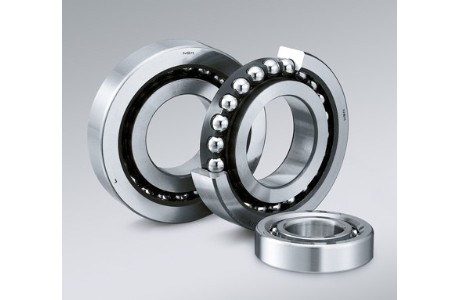- Deep groove ball bearing
- Self-aligning ball bearing
- Angular contact ball bearings
- Thrust ball bearing
- Tapered Roller Bearings
- Spherical roller bearing
- Needle bearing
- Cylindrical Roller Bearings
- Spherical ball bearing with seat
- Linear motion bearing
- Combined bearing
- Joint bearing
- Slewing bearing
- Miniature bearing
- Ceramic ball bearing
- Stainless steel bearing
- Gemstone bearing

Spindle bearing
Product Name: Spindle Bearing
Product ID: 7000 7200 7300
Product Description: The contact ball bearing has a high limit speed, can bear radial load and axial load at the same time, and can also bear pure axial load. Its axial load capacity is determined by the contact angle and increases with the contact angle. .
details:
Paired mounted angular contact ball bearings can withstand radial and axial bidirectional combined loads with radial loads and can withstand pure radial loads. The series configuration can only withstand axial loads in one direction, while the other two configurations can withstand axial loads in either direction. This type of bearing is generally selected by the manufacturer and assembled into a pair of users. After installation, there is preloading and interference, and the ferrule and the steel ball are in an axial preload state, thus improving the whole set of bearings as a single support stiffness and rotation. Precision.
Single row angular contact ball bearings can only withstand axial loads in one direction. When subjected to radial loads, they will cause additional axial forces and must be applied to the corresponding reverse loads. Therefore, these bearings are generally used in pairs. Double row angular contact ball bearings can withstand large radial and axial bidirectional combined loads and moment loads, mainly radial loads, which limit the axial displacement of the shaft or casing in both directions with a contact angle of 30 degrees.
Angular contact ball bearings can withstand radial and axial loads due to the relative displacement of the inner and outer races on the horizontal axis. Combined load (single row angular contact ball bearings can only withstand uniaxial axial loads, Therefore, it is usually used in pairs.
Angular contact ball bearings are available in 7000C (∝=15°), 7000AC (∝=25°) and 7000B (∝=40°) types. The bearing of this kind of bearing is on the outer ring. Generally, the inner and outer rings cannot be separated, and can bear the combined load of radial and axial directions and the axial load in one direction. The ability to withstand axial loads is determined by the contact angle, and the greater the contact angle, the higher the ability to withstand axial loads. This type of bearing limits the axial displacement of the shaft or housing in one direction.
Product ID: 7000 7200 7300
Product Description: The contact ball bearing has a high limit speed, can bear radial load and axial load at the same time, and can also bear pure axial load. Its axial load capacity is determined by the contact angle and increases with the contact angle. .
details:
Paired mounted angular contact ball bearings can withstand radial and axial bidirectional combined loads with radial loads and can withstand pure radial loads. The series configuration can only withstand axial loads in one direction, while the other two configurations can withstand axial loads in either direction. This type of bearing is generally selected by the manufacturer and assembled into a pair of users. After installation, there is preloading and interference, and the ferrule and the steel ball are in an axial preload state, thus improving the whole set of bearings as a single support stiffness and rotation. Precision.
Single row angular contact ball bearings can only withstand axial loads in one direction. When subjected to radial loads, they will cause additional axial forces and must be applied to the corresponding reverse loads. Therefore, these bearings are generally used in pairs. Double row angular contact ball bearings can withstand large radial and axial bidirectional combined loads and moment loads, mainly radial loads, which limit the axial displacement of the shaft or casing in both directions with a contact angle of 30 degrees.
Angular contact ball bearings can withstand radial and axial loads due to the relative displacement of the inner and outer races on the horizontal axis. Combined load (single row angular contact ball bearings can only withstand uniaxial axial loads, Therefore, it is usually used in pairs.
Angular contact ball bearings are available in 7000C (∝=15°), 7000AC (∝=25°) and 7000B (∝=40°) types. The bearing of this kind of bearing is on the outer ring. Generally, the inner and outer rings cannot be separated, and can bear the combined load of radial and axial directions and the axial load in one direction. The ability to withstand axial loads is determined by the contact angle, and the greater the contact angle, the higher the ability to withstand axial loads. This type of bearing limits the axial displacement of the shaft or housing in one direction.





